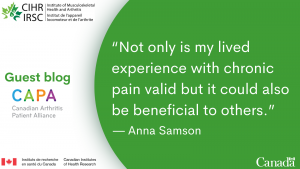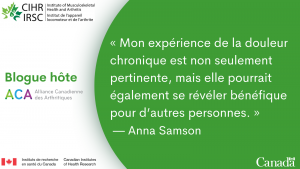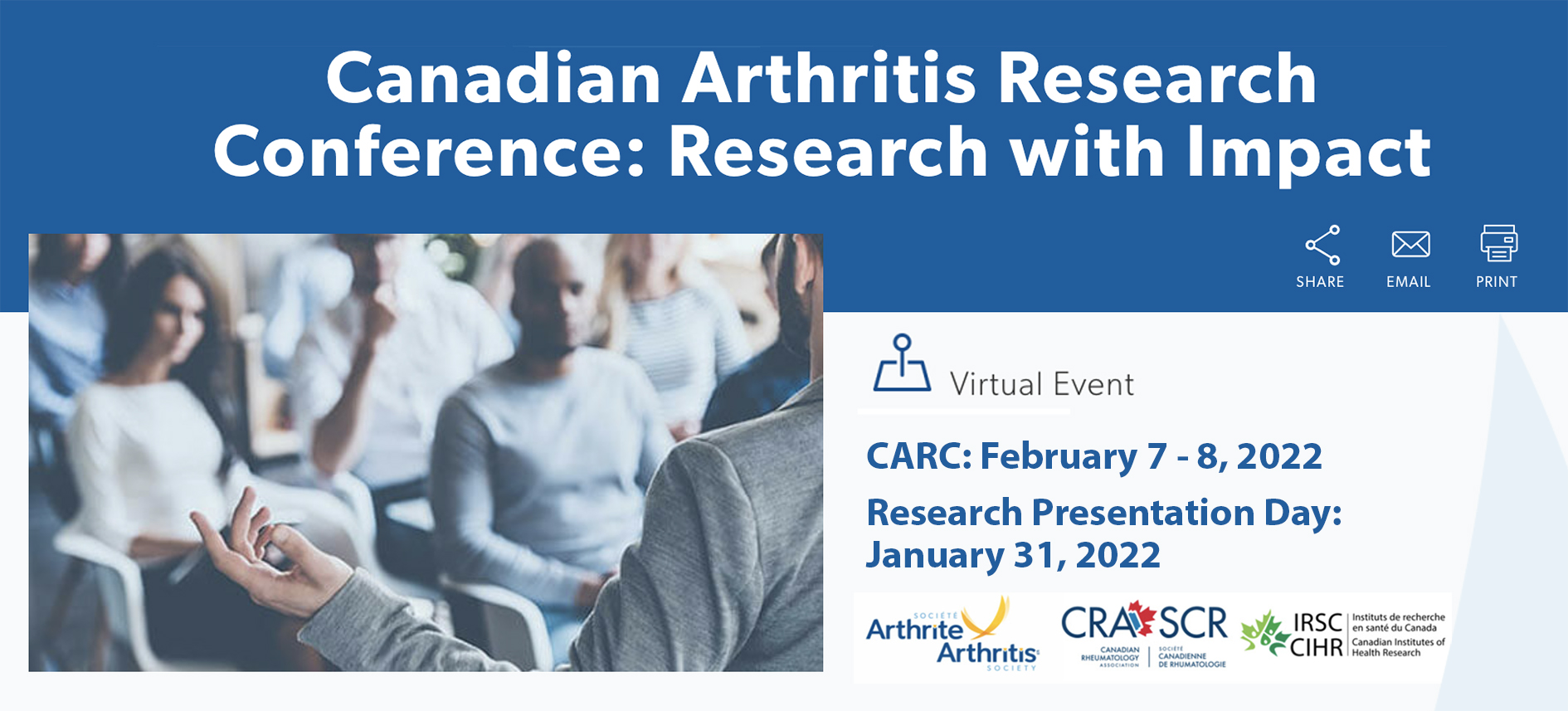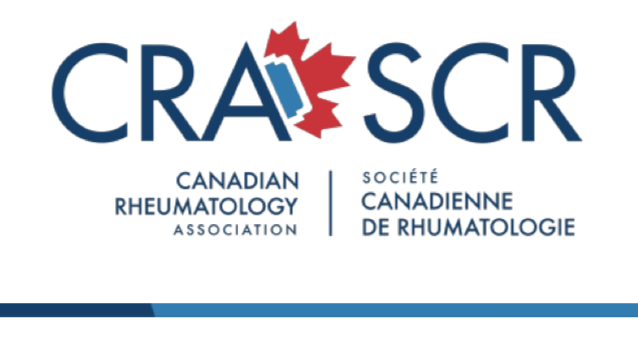By: Laurie Proulx, Nadine Lalonde, Anna Samson, Linda Roy, Julie McKenna
Le français suit / French follows
CIHR-IMHA thanks our guest authors for sharing their time and experience in writing this pertinent case study.
The lived experiences of patients are part of the fabric of the Canadian Arthritis Patient Alliance (CAPA). CAPA has over a decade of involvement as patient partners in research, and is a grassroots, patient driven and managed organization. The board is made up of people with arthritis who set the strategic direction and manage day to day operations. Many in CAPA’s community, including founder Ann Qualman who lived with Rheumatoid Arthritis, were instrumental in creating the Canadian Arthritis Network. This research network made patient partnership central to its mandate and operations over a decade before the Canadian Institutes of Health Research Strategy for Patient-Oriented Research was established.
CAPA’s board recently identified a need to broaden and diversify the community of patient partners that contribute to health research. Board members receive many requests to be part of research teams, know they can’t represent all patient perspectives in research, and are unable to keep up with the demand.
The Canadian Institutes of Health Research Institute of Musculoskeletal Health and Arthritis (CIHR-IMHA) provided support for CAPA’s efforts to expand and support the community of patient partners in research through a new training and mentoring program. This new program provided skill development and mentorship from experienced patient partners, giving new patient partners a solid foundation of knowledge about the health research process and lots of opportunities to become engaged in research. As experienced patient research partners, we know how it can be overwhelming to be added to a research team without some support.

New patient partners ready to join research teams
To launch this new training and mentoring program, CAPA hosted an open call shared on Twitter, Instagram, Facebook and newsletters for people with lived experience of arthritis who may wish to get involved in health research projects and teams. With great response, six individuals were invited to be part of this new cohort of patient research partners. This free online program, co-developed by CIHR-IMHA and patient partners, introduces patient engagement in research, the research process, successful partnership and being part of a research team. This provided a formal training program, complemented by an on-line community where new resources are posted, opportunities for involvement are shared, and peer support is provided.
To date, members of the new group have completed grant peer review for the Arthritis Health Professions Association and have been matched to research projects with established researchers and trainees about COVID-19 vaccine immunity, sexual and reproductive health, and osteoarthritis.
The experience has been positive for the patient research partners. Anna Samson recently shared on social media “The biggest thing I learned from this is that my lived experience is important…But this affirmed for me that not only is my lived experience with chronic pain valid but it could also be beneficial to others.”
You can learn more about the new members ‘graduating’ from this program on the CAPA website. The patient research partners have a variety of lived experiences, expertise, and interests to offer to research teams. You can get in touch with them by emailing our organization. This new group is eager, motivated, and ready to be matched to new and ongoing research projects, CIHR grant proposals, and other health research activities like peer review. Looking ahead with our larger community of patient partners, we hope to make patient engagement meaningful for researchers and patient partners.
Étude de cas : élargir et soutenir la communauté de patients partenaires en recherche
L’IALA des IRSC remercie les personnes qui ont pris le temps de témoigner de leur expérience en rédigeant cette étude de cas fort à propos.
Le vécu des patients forme la trame de l’Alliance canadienne des arthritiques (en anglais seulement) (ACA), organisme citoyen qui s’implique depuis plus de dix ans dans la recherche. L’ACA est dirigé par les patients, pour les patients : son conseil d’administration est formé de personnes atteintes d’arthrite qui établissent l’orientation stratégique de l’organisme et en gèrent les activités quotidiennes. De nombreux membres de la communauté de l’ACA, comme la fondatrice Ann Qualman qui était atteinte de polyarthrite rhumatoïde, ont joué un rôle déterminant dans la création du Réseau canadien de l’arthrite. Ce réseau de recherche a placé le partenariat avec le patient au cœur de son mandat et de ses activités plus de dix ans avant la mise en place de la Stratégie de recherche axée sur le patient des Instituts de recherche en santé du Canada.
Le conseil d’administration de l’ACA a récemment reconnu la nécessité d’élargir et de diversifier la communauté de patients partenaires qui contribuent à la recherche en santé. En effet, les membres du conseil sont bien conscients qu’il est impossible pour eux de faire résonner les voix de tous les patients dans la recherche; d’ailleurs, ils reçoivent de nombreuses demandes d’intégration à des équipes de recherche, mais ils ne sont pas en mesure de répondre à la demande.
L’Institut de l’appareil locomoteur et de l’arthrite des Instituts de recherche en santé du Canada (IALA des IRSC) a appuyé les efforts de l’ACA à cet égard en mettant en œuvre un nouveau programme de formation et de mentorat qui permet aux patients partenaires d’expérience de transmettre leur savoir et de conseiller les novices. Résultat : les nouvelles recrues ont une meilleure idée du processus de recherche en santé et se voient offrir de nombreuses occasions de participer à la recherche. En tant que patients partenaires chevronnés, nous savons qu’il peut être très difficile de s’intégrer à une équipe de recherche sans soutien.
De nouveaux patients partenaires fin prêts à se joindre à des équipes de recherche
Pour promouvoir ce nouveau programme de formation et de mentorat, l’ACA a publié une demande de participation ouverte (en anglais seulement) sur Twitter, Instagram, Facebook et dans des bulletins afin de trouver des personnes touchées par l’arthrite qui s’intéressent à la recherche en santé et souhaiteraient éventuellement faire partie d’une équipe de recherche. Les intéressés se sont manifestés en grand nombre, et six personnes (en anglais seulement) ont été invitées à former une nouvelle cohorte de patients partenaires. Ce programme en ligne gratuit, élaboré conjointement par l’IALA des IRSC et des patients partenaires, présente les principes de la mobilisation des patients dans la recherche, le processus de recherche, les caractéristiques d’un partenariat fructueux et l’intégration d’un patient dans une équipe de recherche. À cette formation structurée s’est ajoutée une communauté en ligne permettant la publication de nouvelles ressources, la promotion d’occasions de participation à la recherche et le soutien par les pairs.
Les membres de la cohorte ont déjà mis leurs nouvelles connaissances au service de l’évaluation par les pairs des demandes de subvention présentées à l’Arthritis Health Professions Association et ont été jumelés à des chercheurs établis et à des stagiaires dans le cadre de projets sur l’immunité vaccinale contre la COVID-19, la santé sexuelle et reproductive, et l’arthrose.
Les patients partenaires ont bien aimé leur expérience, comme en témoigne un message publié sur les médias sociaux (en anglais seulement) par Anna Samson, dont en voici un extrait traduit : « Ce que je retiens surtout, c’est que mon vécu est important. […] Mon expérience de la douleur chronique est non seulement pertinente, mais elle pourrait également se révéler bénéfique pour d’autres personnes. »
Rendez-vous sur le site Web (en anglais seulement) de l’ACA pour en savoir plus sur les personnes qui ont suivi ce programme. Les patients partenaires sont des atouts précieux pour la recherche en raison de la grande variété d’expériences, de connaissances et d’intérêts qui les animent. Pour communiquer avec eux, n’hésitez pas à envoyer un courriel à notre organisme. Ce nouveau groupe est enthousiaste, motivé et prêt à s’associer à des projets de recherche nouveaux et existants, à des demandes de subvention destinées aux IRSC et à d’autres activités de recherche en santé comme l’évaluation par les pairs. Nous espérons que cette communauté élargie de patients partenaires permettra à la mobilisation des patients de gagner ses lettres de noblesse auprès des chercheurs et des patients partenaires.




 Virtual care, also known as telemedicine, eHealth and mHealth, has become increasingly important during the COVID-19 global pandemic.
Virtual care, also known as telemedicine, eHealth and mHealth, has become increasingly important during the COVID-19 global pandemic.